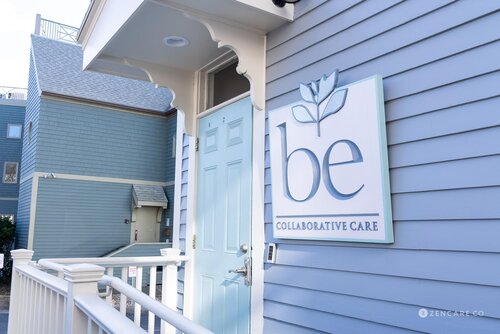






Be Collaborative Care
Treatment Focus
You can get treatment for eating disorders at this center, helping you navigate symptoms, build coping tools, and restore your physical health under expert care.
Primary Level of Care
Outpatient treatment offers flexible therapeutic and medical care without the need to stay overnight in a hospital or inpatient facility. Some centers off intensive outpatient program (IOP), which falls between inpatient care and traditional outpatient service.
Claimed
Recovery.com has connected directly with this treatment provider to validate the information in their profile.
Treatment Focus
You can get treatment for eating disorders at this center, helping you navigate symptoms, build coping tools, and restore your physical health under expert care.
Primary Level of Care
Outpatient treatment offers flexible therapeutic and medical care without the need to stay overnight in a hospital or inpatient facility. Some centers off intensive outpatient program (IOP), which falls between inpatient care and traditional outpatient service.
Provider's Policy
We only accept commercial insurance. We are not contracted with any Public or Community plans. Commercial health insurance is health insurance provided and administered by public and private companies, rather than by the government. We do NOT accept Medicare, Medicaid, or other State funded community or public health plans (i.e., UnitedHealthcare Rite Care, Neighborhood Health Community Plan).
Be Collaborative Care
Be Collaborative Care
About Be Collaborative Care
be Collaborative Care is a specialized eating disorder treatment program that offers hand-crafted treatment plans and varying levels of outpatient care. Located in Providence, Rhode Island, be Collaborative treats adolescents, adults, and LGBTQ+, struggling with anorexia, bulimia, binge eating disorder, compulsive overeating and other disordered eating behaviors. The goal of be Collaborative is to treat the underlying cause and/or any co-occurring mental health disorders like anxiety and depression in order to unravel the roots of food, eating, and emotion by integrating individual and group counseling with nutrition and movement coaching.
Morning and Evening IOP
be Collaborative has 2 intensive outpatient programs (IOP) one in the morning and the other in the evening. The morning IOP meets 4-days a week and the evening IOP 5-days a week. Each program offers meal support and group therapy while covering topics like body acceptance, values, and self-worth. Individuals will also participate in real life experiences like mastering particular difficult tasks (such as meal preparation, grocery shopping, cooking, dining out, etc.), or learning more effective ways to communicate with friends and family.
Commercial Insurance Accepted
“be Collective only accepts commercial insurance. We are not contracted with any Public or Community plans. Commercial health insurance is health insurance provided and administered by public and private companies, rather than by the government. They do not accept Medicare, Medicaid, or other State funded community or public health plans (i.e., UnitedHealthcare Rite Care, Neighborhood Health Community Plan).”

Center Overview
Treatment Focus
You can get treatment for eating disorders at this center, helping you navigate symptoms, build coping tools, and restore your physical health under expert care.
Insurance Accepted
Cash Pay Rates
Estimated Cash Pay Rate
Center pricing can vary based on program and length of stay. Contact the center for more information. Recovery.com strives for price transparency so you can make an informed decision.
Levels of Care




Your Care Options
Specializations
Intensive Outpatient Program
In an IOP, patients live at home or a sober living, but attend treatment typically 9-15 hours a week. Most programs include talk therapy, support groups, and other methods.
Eating Disorders
An eating disorder is a long-term pattern of unhealthy behavior relating to food. Most people with eating disorders have a distorted self-image.
Who We Treat
Men and Women
Men and women attend treatment for addiction in a co-ed setting, going to therapy groups together to share experiences, struggles, and successes.
Adolescents
Teens receive the treatment they need for mental health disorders and addiction, with the added support of educational and vocational services.
Midlife Adults
For adults ages 40+, treatment shifts to focus on the unique challenges, blocks, and risk factors of their age group, and unites peers in a similar community.
Older Adults
Addiction and mental health treatment caters to adults 55+ and the age-specific challenges that can come with recovery, wellness, and overall happiness.
LGBTQ+
Addiction and mental illnesses in the LGBTQ+ community must be treated with an affirming, safe, and relevant approach, which many centers provide.
Approaches
Non 12 Step
Non-12-Step philosophies veer from the spiritual focus of the 12-Steps and instead treat the disease of addiction with holistic or secular modalities.
Evidence-Based
A combination of scientifically rooted therapies and treatments make up evidence-based care, defined by their measured and proven results.
Individual Treatment
Individual care meets the needs of each patient, using personalized treatment to provide them the most relevant care and greatest chance of success.
Therapies
1-on-1 Counseling
Patient and therapist meet 1-on-1 to work through difficult emotions and behavioral challenges in a personal, private setting.
Acceptance and Commitment Therapy (ACT)
This cognitive behavioral therapy teaches patients to accept challenging feelings and make the appropriate changes to reach personal goals.
Psychoeducation
This method combines treatment with education, teaching patients about different paths toward recovery. This empowers them to make more effective decisions.
Experiential Therapy
With this approach, patients heal by doing. Therapists help patients process difficult emotions to speak, using guided activities like art or dance.
Expressive Arts
Creative processes like art, writing, or dance use inner creative desires to help boost confidence, emotional growth, and initiate change.
Interpersonal Therapy
This brief and structured therapy addresses present relationships and improves overall communication at work, home, and other social settings.
Conditions We Treat
Anxiety
Anxiety is a common mental health condition that can include excessive worry, panic attacks, physical tension, and increased blood pressure.
Depression
Symptoms of depression may include fatigue, a sense of numbness, and loss of interest in activities. This condition can range from mild to severe.
Trauma
Some traumatic events are so disturbing that they cause long-term mental health problems. Those ongoing issues can also be referred to as "trauma."
Eating Disorders
An eating disorder is a long-term pattern of unhealthy behavior relating to food. Most people with eating disorders have a distorted self-image.





